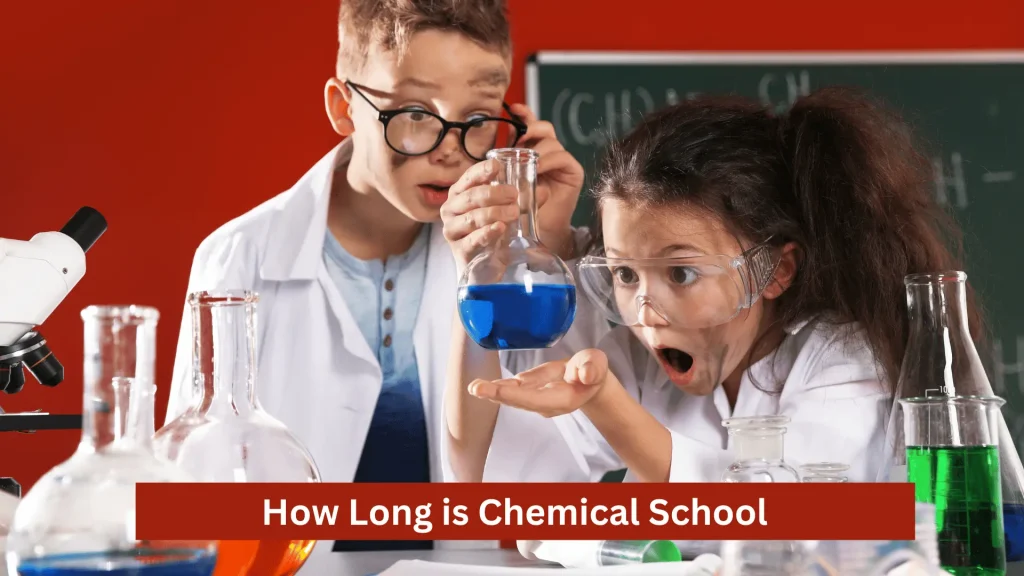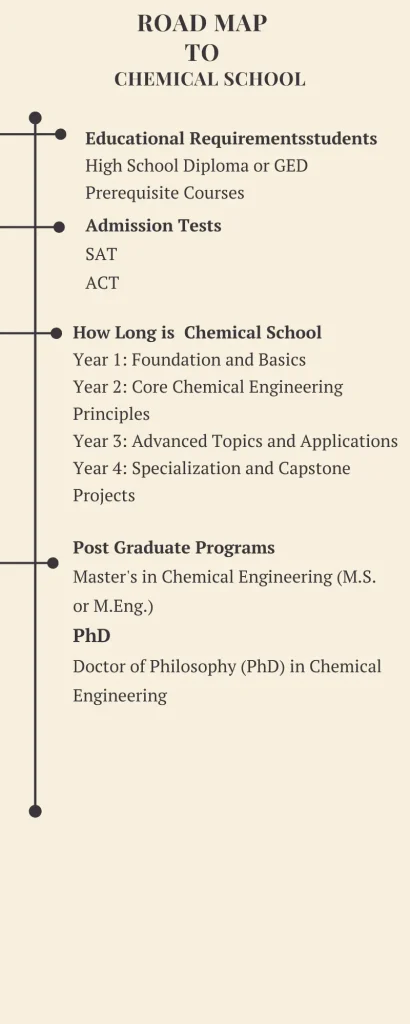How Long is Chemical School
How Long is Chemical School? The duration of chemical school varies, typically lasting between 4 to 6 years. This includes undergraduate programs and advanced degrees. How long is chemical school depends on the specific program and educational path chosen by the student.
What is Chemical School
Chemical school, also known as a chemical engineering program, educates students on the principles of chemistry, physics, and biology to develop processes and products. It covers subjects like organic chemistry, thermodynamics, and process design, preparing graduates for careers in industries such as pharmaceuticals, energy, and manufacturing.

A chemical school program combines theoretical knowledge with practical applications, often including laboratory work and internships. Students learn to solve complex problems, optimize production processes, and ensure safety and sustainability. Graduates can pursue roles in research and development, environmental protection, and quality control, contributing to advancements in technology and industry.
How Long is Chemical School
Year 1: Foundations
Courses: General Chemistry, Calculus, Physics, Introduction to Engineering
Focus: Building a strong foundation in basic sciences and mathematics, along with an introduction to engineering principles.
Activities: Laboratory work, introductory engineering projects, and seminars on various engineering disciplines.
Year 2: Core Chemical Engineering Principles
Courses: Organic Chemistry, Physical Chemistry, Differential Equations, Material and Energy Balances
Focus: Delving deeper into chemical principles and starting to apply them to engineering problems.
Activities: More intensive lab work, small-scale design projects, and developing problem-solving skills.
Year 3: Advanced Topics and Applications
Courses: Thermodynamics, Fluid Mechanics, Heat and Mass Transfer, Chemical Reaction Engineering
Focus: Learning advanced chemical engineering concepts and beginning to apply them in more complex scenarios.
Activities: Hands-on lab work, simulations, and team projects focusing on real-world engineering problems.
Year 4: Specialization and Capstone Projects
Courses: Process Design, Process Control, Elective Courses in Specialized Areas (e.g., Biochemical Engineering, Environmental Engineering)
Focus: Applying all the knowledge gained to design and optimize chemical processes.
Activities: Capstone design projects, internships, industry collaborations, and preparation for professional practice or further study.

Throughout the program, students also engage in general education courses, ethics, and professional development to ensure a well-rounded education.
How to Enter Chemical School
Educational Requirements for Chemical School
High School Diploma or Equivalent: Completion of high school with a strong academic record.
Prerequisite Courses: High school courses in mathematics (including calculus), chemistry, physics, and sometimes biology.
GPA Requirements: A competitive GPA, often a minimum of 3.0 on a 4.0 scale, though higher is preferable.
Entry Tests for Chemical School
Standardized Tests: SAT or ACT scores are commonly required.
SAT: Typically, a score of 1200 or higher is preferred.
ACT: Generally, a score of 25 or higher is desirable.
Subject Tests: Some schools may require SAT Subject Tests in Math and Science.
English Proficiency Tests: For international students, tests like TOEFL or IELTS might be required.
Application Process for Chemical School
Online Application: Most schools use an online portal for applications.
Application Fee: An application fee, typically ranging from $50 to $100, may be required.
Transcripts: Official high school transcripts or GED scores.
Letters of Recommendation: Usually 2-3 letters from teachers or professionals who can attest to the applicant’s academic and personal qualifications.
Personal Statement: An essay or statement of purpose explaining the applicant’s interest in chemical engineering and career goals.
Extracurricular Activities: Information about involvement in relevant extracurricular activities, such as science clubs or volunteer work.
Interview: Some schools may require an interview as part of the admission process.
Financial Aids for Chemical School
Scholarships: Merit-based and need-based scholarships offered by universities, private organizations, and government bodies.
University Scholarships: Often automatically considered upon application or require a separate application.
External Scholarships: Industry-specific scholarships from chemical engineering societies or foundations.
Grants: Federal and state grants such as Pell Grants, which do not need to be repaid.
Loans: Federal student loans (e.g., Stafford Loans, PLUS Loans) and private loans from banks or financial institutions.
Work-Study Programs: Part-time employment opportunities provided by the school to help cover educational expenses.
Financial Aid Application: Completing the Free Application for Federal Student Aid (FAFSA) or other institutional financial aid forms to determine eligibility for various financial aids.
Post Graduate and PhD Programs
Post Graduate Programs for Chemical School
Master’s in Chemical Engineering (M.S. or M.Eng.):
- Program Duration: Typically 1-2 years.
- Core Courses:
Advanced Thermodynamics
Advanced Transport Phenomena
Chemical Reaction Engineering
Process Design and Optimization
- Specializations:
Environmental Engineering
Biochemical Engineering
Materials Science
Process Control
- Thesis/Non-Thesis Options:
Thesis Option: Involves conducting original research and writing a thesis.
Non-Thesis Option: Focuses more on coursework and may include a capstone project.
- Admission Requirements:
Bachelor’s degree in Chemical Engineering or related field.
GRE scores (optional at some institutions).
Letters of recommendation.
Statement of purpose.
Relevant work or research experience (optional but beneficial).
PhD Programs for Chemical School
Doctor of Philosophy (PhD) in Chemical Engineering:
- Program Duration: Typically 4-6 years.
- Core Courses:
Advanced Topics in Chemical Engineering
Research Methods and Experimental Techniques
Electives in specialized areas (e.g., nanotechnology, catalysis)
- Research Focus:
Conducting original research leading to new discoveries or innovations.
Publishing research findings in academic journals.
Presenting research at conferences.
- Comprehensive Exams:
Written and/or oral exams to assess mastery of the field.
- Dissertation:
Original research project culminating in a written dissertation.
Defense of the dissertation before a committee of experts.
- Admission Requirements:
Master’s or bachelor’s degree in Chemical Engineering or related field.
GRE scores (required by some institutions).
Letters of recommendation.
Statement of purpose.
Research experience (highly preferred).
Publications or presentations (beneficial but not always required).
Top 10 Chemical Engineering Schools

1.Massachusetts Institute of Technology (MIT)
Location: Cambridge, MA, USA
Highlights: Renowned for cutting-edge research and innovation. Offers extensive research facilities and opportunities for interdisciplinary collaboration.
2.Stanford University
Location: Stanford, CA, USA
Highlights: Strong emphasis on entrepreneurship and innovation. Offers numerous research opportunities in biotechnology, energy, and materials science.
3.University of California, Berkeley (UC Berkeley)
Location: Berkeley, CA, USA
Highlights: Known for its research excellence and strong industry connections. Offers programs in environmental engineering, nanotechnology, and renewable energy.
4.California Institute of Technology (Caltech)
Location: Pasadena, CA, USA
Highlights: Small, focused program with a high faculty-to-student ratio. Strong emphasis on research in chemical engineering and applied sciences.
5.University of Cambridge
Location: Cambridge, UK
Highlights: Offers a robust chemical engineering program with a strong research component. Known for its academic excellence and historic legacy.
6.University of California, Santa Barbara (UCSB)
Location: Santa Barbara, CA, USA
Highlights: Known for its interdisciplinary approach and research strengths in materials science, biomolecular engineering, and environmental engineering.
7.University of Oxford
Location: Oxford, UK
Highlights: Offers a rigorous program with strong research opportunities. Focuses on sustainable energy, process engineering, and materials development.
8.ETH Zurich – Swiss Federal Institute of Technology
Location: Zurich, Switzerland
Highlights: Known for its high-impact research and innovation in chemical engineering. Offers programs in process engineering, materials science, and biotechnology.
9.University of California, Los Angeles (UCLA)
Location: Los Angeles, CA, USA
Highlights: Offers a comprehensive chemical engineering program with strong research in nanotechnology, bioengineering, and environmental systems.
10.University of Texas at Austin
Location: Austin, TX, USA
Highlights: Known for its strong industry connections and research in energy, materials science, and environmental engineering. Offers numerous research facilities and collaborative opportunities.
These schools are recognized for their academic excellence, cutting-edge research, and strong industry connections, making them top choices for students pursuing a degree in chemical engineering.
Factors Affecting the Length of Chemical School
Degree Type:
Undergraduate (Bachelor’s Degree): Typically 4 years.
Postgraduate (Master’s Degree): Usually 1-2 years.
Doctoral (PhD): Generally 4-6 years.
Program Structure:
Full-Time vs. Part-Time: Full-time programs are usually completed faster than part-time programs, which allow students to balance other commitments but extend the duration.
Co-op and Internship Programs: Programs with mandatory co-op or internships may take longer but provide valuable work experience.
Specializations and Electives:
Specialized Tracks: Choosing a specialized track or dual degree can add time to the program due to additional coursework or research requirements.
Elective Courses: Taking additional electives or minors can also extend the duration.
Research Requirements:
Thesis and Dissertation: For postgraduate programs, the requirement to complete a thesis or dissertation can affect the length of the program. The complexity and scope of research projects can vary significantly.
Research Opportunities: Extensive involvement in research projects, labs, and publications may extend the time required to graduate.
Academic Load:
Course Load per Semester: Students taking a heavier course load can potentially graduate faster, whereas those taking fewer courses per semester may extend their study period.
Remedial Courses: Needing to take remedial courses to meet prerequisites can add to the program length.
Final Verdict
The duration of chemical school varies depending on the degree type, program structure, research requirements, and personal factors. Understanding these variables helps prospective students plan effectively, balancing their academic goals with personal and professional commitments. With the right planning, students can successfully navigate and complete their chemical engineering education.
FAQs
1.How long does it take to complete an undergraduate chemical engineering degree?
Typically, an undergraduate chemical engineering degree takes about 4 years to complete.
2.What are the prerequisites for entering a chemical engineering program?
Prerequisites usually include a high school diploma with strong coursework in mathematics, chemistry, and physics.
3.Are there financial aids available for chemical engineering students?
Yes, financial aids such as scholarships, grants, loans, and work-study programs are available for chemical engineering students.
4.What are the typical research requirements for a PhD in chemical engineering?
A PhD typically requires original research, a written dissertation, and defense of the dissertation before a committee.
5.Can I pursue a chemical engineering degree part-time?
Yes, many institutions offer part-time options, though this will extend the duration of the program.
